
Phanaeus vindex, also known as a rainbow scarab, is a North American species of true dung beetle in the family Scarabaeidae. It is found in eastern and central United States and northern Mexico. It is the most widespread species of Phanaeus in the United States and it has a wide habitat tolerance. It may hybridize with the generally less common P. difformis.

The scarab beetle subfamily Scarabaeinae consists of species collectively called true dung beetles. Most of the beetles of this subfamily feed exclusively on dung. However, some may feed on decomposing matter including carrion, decaying fruits and fungi. Dung beetles can be placed into three structural guilds based on their method of dung processing namely rollers (telecoprids), dwellers (endocoprids) and tunnelers (paracoprids). Dung removal and burial by dung beetles result in ecological benefits such as soil aeration and fertilization; improved nutrient cycling and uptake by plants, increase in Pasture quality, biological control of pest flies and intestinal parasites and secondary seed dispersal. Well-known members include the genera Scarabaeus and Sisyphus, and Phanaeus vindex.

Onthophagus is a genus of dung beetles in the Onthophagini tribe of the wider scarab beetle family, Scarabaeidae. It is the most species-rich and widespread genus in the subfamily Scarabaeinae, with a global distribution.

Phanaeus, the rainbow scarabs, is a genus of true dung beetles in the family Scarabaeidae, ranging from the United States to northern Argentina, with the highest species richness in Mexico. Depending on species, they can inhabit a wide range of habitats, from tropical to temperate climates and deserts to rainforests. In those living in relatively arid places adults are primarily active during the wet season and those living in relatively cold places are primarily active during the summer. They are excellent diggers and good fliers.

Phanaeus difformis is a species of true dung beetle in the family Scarabaeidae that is native to south-central United States and adjacent far northern Mexico. It may hybridize with the generally more common P. vindex.

Phanaeini is a tribe of dung beetles in the family Scarabaeidae. There are about 12 genera and 200 described species in Phanaeini. They are native to the Americas with the highest species richness in the Neotropics. They are mostly coprophagous or necrophagous, but some of the least known genera appear to be myrmecophilous. They are medium-sized to large beetles, often with bright metallic colors, and often with horns on their heads.
Melanocanthon nigricornis is a species of dung beetle in the family Scarabaeidae.

Melanocanthon is a genus of dung beetles in the family Scarabaeidae. There are at least 4 described species in Melanocanthon.

Melanocanthon bispinatus, the tumble bug, is a species of dung beetle in the family Scarabaeidae.

Copris fricator is a species of dung beetle in the family Scarabaeidae.

Phanaeus amithaon is a species of dung beetle in the family Scarabaeidae.
Haroldiataenius is a genus of aphodiine dung beetles in the family Scarabaeidae. There are about nine described species in Haroldiataenius.
Copris minutus, the small black dung beetle, is a species of dung beetle in the family Scarabaeidae. It is found in North America.

Onthophagus nuchicornis is a species of dung beetle in the family Scarabaeidae. It is found in Europe and North America. Though Onthophagus nuchicornis is listed as "Vulnerable" in the United Kingdom, it is a common and abundant species in North America. It has been used as a model organism for ecotoxicological studies of ivermectin, where different biological endpoints are stimulated at low levels of ivermectin exposure, but impaired at high levels of ivermectin exposure.
Coprophanaeus pluto is a species of dung beetle in the family Scarabaeidae. It is found in Guatemala, Mexico and southernmost Texas ; it is the only species of Coprophanaeus in the United States. This black beetle feeds on carrion and typically is 1.8–2.8 cm (0.7–1.1 in) long.

Phanaeus igneus is a species of dung beetle in the family Scarabaeidae.

Rhyssemus is a genus of aphodiine dung beetles in the family Scarabaeidae. There are more than 160 described species in Rhyssemus.

Phanaeus quadridens is a species of dung beetles in the family Scarabaeidae.
Onthophagus alluvius is a species of dung beetle in the family Scarabaeidae. It is native to the southern United States, including Texas. It has been observed using dog dung.

Phanaeus triangularis, the black phanaeus, is a North American species of true dung beetle in the family Scarabaeidae. It is found in the eastern half of the United States.













